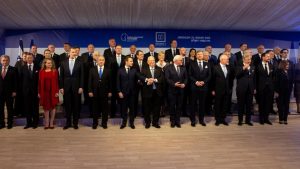
The purpose of our contribution is not here to reproduce a literature, already abundant on the Shoah, but it is a question of how the various political and civil actors ensure over time the memory and identity management in relation to this drama. Beyond these positions, it is about examine the dynamism of internal Jewish historiography to further emphasize the futility of “zozos” (Norman Finkelstein, Yossef Mizrachi) truncated by simplistic views that continue to have an impact on European public opinion. But to locate and orient yourself, it is good to stop for a moment – to reflect on the path already traveled. Hence the importance of memory. In individual life, memory, as Pascal says, is necessary for all mind operations; but it is also essential for the cohesion of the personality.
Before the 75th anniversary of the liberation of Auschwitz, Israel received some 40 world leaders. This International Holocaust Symposium was necessary to counter an attempt
of the collective memory falling asleep, a more or less declared revisionist will, a momentum of unilateral absolution based on summary disquisitions of opinion.
The issues that appear in the reactions of different Presidents present are not limited to a simple object of knowledge. This historic tragedy occupies a considerable thickness in the construction identity underway in contemporary Europe. It constitutes an important dimension of the Being and the Jews in the world today, so ultimately their relationship to the Other.
The weight of the Shoah refers to an undisputed reality: no society, other than the European Jewish community, has also been negatively affected by the Holocaust. The origins of the position of inferiorization in
the affairs of the contemporary world are to be sought in part at least in this long sequence history that has lastingly affected Jewish demography, but especially the representation of oneself and of one’s relationships to others. But the destruction of European Jews was not a shared memory. The consequences of this cataclysm are catastrophic for the Jewish conscience. The demographic drain of six million people
created a drop in human tone and resulted in greater disarray in front of nature. Indeed, it is a well known fact that some loss demographic results in the dehumanization of nature. The abrupt removal of a large proportion of his sons for a long time this grip on nature which gives man confidence and stimulating.
